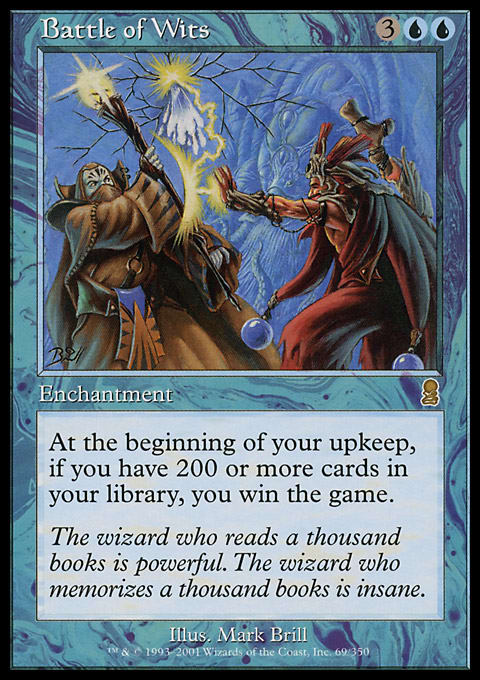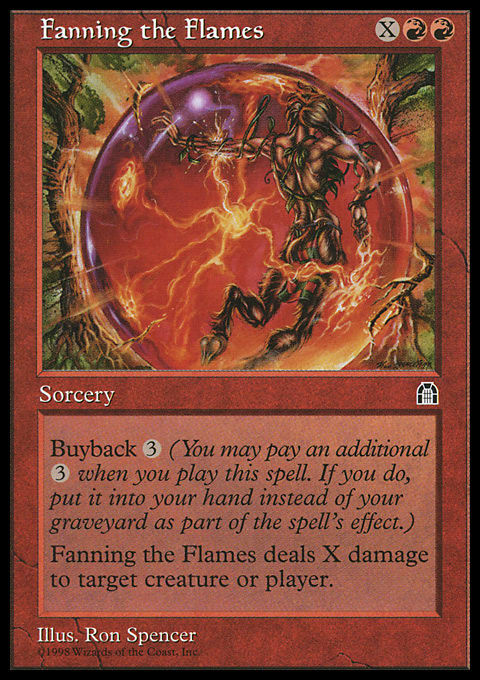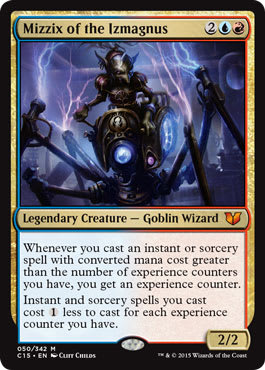One hundred cards sound like a lot, and they surely can be a lot if you’re trying to deck someone, draw a specific answer, or double-sleeve. The number is downright daunting, especially to those of us with decades of experience with sixty- or forty-card piles. It’s a deck and then some for most of us, and seeing a Commander stack for the first time looked almost silly to me—like the Battle of Wits deck I’d played for a while.
One hundred cards can also be far too few. One of the quirks of Commander is that I won’t be playing my Battle of Wits deck in that format since I’m not allowed to have more than one hundred cards. The restriction doesn’t always hurt, but anyone who has ever built a Commander deck will tell you that you start at about one hundred fifty cards and whittle the deck down, sometimes taking out cards you really like. When you account for roughly forty lands, roughly five or ten mana rocks and ramp spells, and your commander—which makes the deck ninety-nine cards—you’re sometimes looking at as few as forty-five or so action cards. That’s less than half of the pile that seemed so daunting. You have to economize a bit, running Charms and Commands that solve multiple scenarios but only take up one card slot. You need to run more X-for-one removal since one-for-one removal is too inefficient to be your only removal. You need to cut cards you’d really rather not cut. Sometimes, you can have a hundred-card deck built and realize you are missing something rather significant.
This is why it usually helps to focus on a “thing” and try to do it. Trying to run a proliferate deck that can kill opponents with poison counters, mill opponents out with Grindclock, make big creatures with Ezuri, Renegade Leader, or kill them with Darksteel Reactor can sometimes run into issues if you don’t have enough cards to support any given path to victory. Sometimes, you need to narrow your focus a bit and think about how you’re going to actually win the game. Win conditions are important, even in a 75% deck that can sometimes rely on your opponents to supply a way for you to win.
I started thinking about how much space I want to devote to win conditions when a reader named Kyle sent me a deck this week. He’s been brewing with Mizzix of the Izmagnus and wanted to know how I thought he did at following 75% principles. What I found was a great degree of adherence to the guidelines—almost all of them. What I didn’t find in overabundance were ways to win the game. Luckily, that’s super-easy to fix, and whenever someone asks me if his or her deck is a good 75% adherent, no one has ever been upset to hear me say he or she could stand to make the deck more powerful.
I don't know how much thought you've given to Mizzix, but I wanted to share what I've been working on and get your opinion. I've channeled some 75% principles, but there is some flexibility in the card choices, so I wanted to get your opinion:
- Creatureless — Putting some limitations on what we can or cannot play puts a ceiling on the power level of the deck.
- Card-draw, not tutors — This is mostly just a byproduct of so much card-draw, but outside of Firemind's Foresight (which could easily go), I don't think the deck really needs or wants tutors.
- Scalability — I think this could be bumped up, but steal and copy effects like Desertion, Bribery, and Rite of Replication are right at home in this list. We don't have a lot of ways to win "on our own," so copying or stealing the opponents' stuff is probably our main path to victory.
Any input you have would be great. The list seems like a lot of fun, but it's pretty untuned. Any gems I missed? How'd I do with the 75% principles?
Thanks for your time,
Kyle
How did Kyle do? Let’s take a look at his list, shall we?
Mizzix of the Izmagnus ? Commander | Kyle
- Commander (0)
- Spells (64)
- 1 Aetherize
- 1 Arcane Denial
- 1 Blue Sun's Zenith
- 1 Brainstorm
- 1 Chaos Warp
- 1 Comet Storm
- 1 Desertion
- 1 Desperate Ravings
- 1 Fact or Fiction
- 1 Firemind's Foresight
- 1 Frantic Search
- 1 Grab the Reins
- 1 Intellectual Offering
- 1 Izzet Charm
- 1 Magmaquake
- 1 Mirror Match
- 1 Mystic Confluence
- 1 Reality Spasm
- 1 Reins of Power
- 1 Reiterate
- 1 Repeal
- 1 Scour from Existence
- 1 Snap
- 1 Steady Progress
- 1 Steam Augury
- 1 Volt Charge
- 1 Whispers of the Muse
- 1 Breakthrough
- 1 Bribery
- 1 Call the Skybreaker
- 1 Chain Reaction
- 1 Clone Legion
- 1 Deep Analysis
- 1 Epic Experiment
- 1 Faithless Looting
- 1 Fiery Confluence
- 1 Illuminate
- 1 Mizzium Mortars
- 1 Mizzix's Mastery
- 1 Mystic Speculation
- 1 Past in Flames
- 1 Ponder
- 1 Preordain
- 1 Recoup
- 1 Recurring Insight
- 1 Rite of Replication
- 1 Stolen Goods
- 1 Surreal Memoir
- 1 Tezzeret's Gambit
- 1 Thieves' Auction
- 1 Turn // Burn
- 1 Vandalblast
- 1 Wheel of Fortune
- 1 All Is Dust
- 1 Cyclonic Rift
- 1 Inexorable Tide
- 1 Chromatic Lantern
- 1 Fellwar Stone
- 1 Izzet Signet
- 1 Mind Stone
- 1 Sol Ring
- 1 Star Compass
- 1 Thought Vessel
- 1 Coldsteel Heart
- Lands (35)
- 14 Island
- 8 Mountain
- 1 Blighted Cataract
- 1 Command Tower
- 1 Desolate Lighthouse
- 1 Evolving Wilds
- 1 Reflecting Pool
- 1 Reliquary Tower
- 1 Scalding Tarn
- 1 Shivan Reef
- 1 Steam Vents
- 1 Sulfur Falls
- 1 Temple of Epiphany
- 1 Temple of the False God
- 1 Terramorphic Expanse
I was a pretty big fan of what I saw, although I also saw something Kyle himself acknowledged: How are we supposed to win the game? I wrote back.
I like it.
I might jam something like Vedalken Shackles or another reusable way to steal dudes. Chamber of Manipulation is an underrated card for sure. As it is, Bribery, Rite, etc. are all fine.
I like the lack of tutors, but your main issue is win conditions. You have a few, and borrowing opponents’ creatures obviously helps. Mirari or Cloven Casting or something like that would be right at home here. Cheat as much as possible. If your spells are getting cheaper, Fanning the Flames is a must-include. Prophetic Bolt also makes a lot of sense if you can double spells. Think about how you want to win, and lend yourself a few more cards in that direction. I think this adheres well to the 75% principles—pretty much all of them, which is actually not even necessary. Those are more paths you can take than rules, and you seem to go down every path at once. That's cool!
This can be more powerful and still be 75% because what you built doesn't violate any rules. Pick a victory path, and support it with a few more cards, and cut some weaker or questionable ones. Wheel of Fortune and Mystic Speculation stick out as being a little "off," and I am sure you can find some cuts even if you keep those cards. The deck is fine and can be more powerful, and I think this is a great start.
Kyle posted a later version of the deck that removed Mystic Speculation, Brainstorm, Ponder, Preordain, Wheel of Fortune, and a few other cards and that added Vedalken Shackles, Mirari, Cloven Casting, and Fanning the Flames, adding a few more suggestions to the “maybeboard,” which a lot of players use as a pile of cards they sometimes test in the deck, so maybe he can find some more room for some of those cards.
Is what we came up with based on my initial suggestions and his subsequent changes enough? Do we need to choose between opponents’ dudes and trying to win another way? Fanning the Flames seems to be a very slow and laborious way to kill them, and maybe we’d be better off using that to kill creatures. Then again, how many win conditions do we need on top of their creatures?
I looked at about a dozen Mizzix lists online, and they all seemed very light on win conditions. What is going to distinguish a 75% Mizzix deck is not just having one win condition (Ignite Memories, Laboratory Maniac), but several of them, so you don’t take the exact same path to victory each time. I think what we have here is pretty solid. You have ways to take opposing creatures, which helps you with win conditions and scaling, and that’s important. If I could add a few cards, they’d maybe be Blatant Thievery and definitely Insurrection. I still want to see someone give Chamber of Manipulation a try, as it’s a great way to pitch excess lands and turn them into creatures, but its exclusion doesn’t break my heart or anything.
Reducing spells’ costs is a great way to make Aethersnatch and Desertion even more effective. You can keep ![]()
![]() up easily and maybe even use those spells in a pinch to counter something game-breaking. Insurrection and Blatant Thievery are expensive, but that’s a good thing. Play them too early, and you risk not having them impact the game enough. Still, their high costs will at least help you gain experience counters—if you even need them at that point.
up easily and maybe even use those spells in a pinch to counter something game-breaking. Insurrection and Blatant Thievery are expensive, but that’s a good thing. Play them too early, and you risk not having them impact the game enough. Still, their high costs will at least help you gain experience counters—if you even need them at that point.
Did we water down our paths to victory by trying to do too much at once? I don’t think we did. Copying our value spells with Mirari is a good way to win any game no matter what the outcome. On second glance, we don’t really have enough gold spells to make Cloven Casting worth it, so that can probably come out for an Insurrection or Aethersnatch. Copying any spell is going to be great in this deck, so I’m not concerned this will distract from us winning the game.
Our stealing-stuff game is strong, so there’s no worry there if you ask me. Some of the spells are one-shot, like Bribery, but if you take something good enough, you won’t need too many anyway. Reusable cards like Vedalken Shackles are excellent in a build like this since you can block aggressively. Adding the few spells I talked about from the “maybeboard” and cutting Cloven Casting and maybe something like Breakthrough (even as good as that is when you have like ten experience counters) can give us enough to always have a few creatures on the board, none of them ours.
I learned a lot in the process of writing this piece that I’d like to share. My initial feeling was that we didn’t want to dilute our “strategy” by having too many distractions. I felt decks should have a “thing” and try to do them—a Voltron deck wins by attacking with the commander, a combo deck combos, and a value deck tries to overwhelm the board. I thought we could run the risk of putting too many creature-swipe cards and too many value spells and be at cross-purposes, impacting our ability to win. What I found was that Mizzix decks do have a “thing,” but it’s not as clear as it is with other decks. We’re trying to make our spells cheaper so we can do more in a turn and make each turn better than the last. Playing value spells, reducing costs, doubling them—all of this lets us find our creature-swipe cards without having to tutor for them. It lets us be a threat without having creatures. It lets us impact the game without looking like so much of a threat that we become the main focus, but it lets us find the cards that save our bacon, like Aetherize and Cyclonic Rift, somewhat easily. All in all, the deck is going to do its thing, and its thing is doing both of those things well. That wasn’t clear to me immediately, but I learned that over the course of this process, and I’m glad you all came along with me for the ride.
The deck still seems like somewhat of a mess to me, but it will be tuned up with some games jammed rather than through theory-crafting. A deck’s weaknesses have a way of revealing themselves, and a robust “maybeboard’ with problem-solvers ready to jam in can be just as important as getting your hundred pretty close on the first try by being overly analytical during the planning process. I think the deck will end up looking pretty similar to this one, and I welcome it. He may even end up adding back in some cards I cut, finding buyback Mystic Speculation can stack your deck as well as give you a ton of Inexorable Tide triggers to make your X spells insanely powerful with experience counters. He may find he’s not making the most of proliferating and add cards that benefit, or by removing weaker-feeling cards like Volt Charge. What I am sure of is that this deck follows our 75% rules, and it’s going to be a blast stealing our opponents’ creatures to win the game.
How would you go with this deck or one like it? Mizzix High Tide? Mizzix Ignite Memories? Mizzix proliferate madness? Would you add creatures to have access to Guttersnipe, Melek, Izzet Paragon, and other goods or do you like Kyle’s creatureless approach? Leave it in the comments section. I’m proud of the lessons I learned this week, and I hope you learned a little bit as well. Until next week!

























